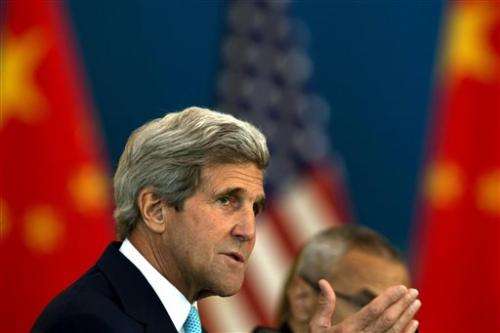Kerry cites frank cyberhacking talks with China (Update 2)

China and the United States on Thursday promised closer cooperation on climate change and North Korea, although China warned the U.S. not to take sides on its maritime disputes with Asian neighbors.
The two sides discussed cyberhacking but announced no progress toward resolving U.S. accusations of widespread Chinese theft of government and corporate secrets.
At the conclusion of an annual high-level dialogue, U.S. Secretary of State John Kerry said the two sides discussed ways to persuade North Korea to give up nuclear weapons. "We both understand that there's more we can do in order to bring North Korea into compliance with its obligations to denuclearize."
The U.S. has long pushed for China to use its relationship with North Korea as its only major ally and crucial source of fuel and food to pressure it to give up its nuclear capabilities. The U.S. and Western leaders saw President Xi Jinping's visit to South Korea last week as a positive sign.
Yang Jiechi, China's top diplomat, said it was important to maintain restraint in dealing with North Korea and said the two sides could do "more things to relax the situation."
Meeting later with Xi, Kerry said the two sides had come to agreement "that we must press forward together in unity with respect to Iran's nuclear program." They are both part of the six-nation group that is trying to thrash out a nuclear deal with Iran. Kerry also said close cooperation between the two was essential to deal with other world problems such as conflicts in Ukraine, Iraq and Syria.
Officials from the two countries met Wednesday and Thursday for an annual strategic and economic dialogue aimed at fostering a more cooperative relationship between the world's No. 1 and No. 2 economies.
The U.S. had hoped to secure an end to alleged Chinese industrial cyberespionage against American companies and stricter rules governing territorial claims in Asia's contested, resource-rich seas.
Kerry said that the two sides had a frank exchange about cyberhacking, which he said was hurting U.S. companies and having a "chilling effect on innovation and investment."
He made no mention of a New York Times report suggesting significant Chinese hacking of information about U.S. government personnel.
China's government has rejected accusations that it is encouraging cyberhacking, though it has given no indication it has investigated the U.S.' complaints. Yang repeated his government's previous position that cyberhacking is a "common threat facing all countries."
Yang said the issue required mutual trust. "Cyberspace should not become a tool for damaging the interests of other countries," he said.
The two countries have been at odds over U.S. indictments of five Chinese military officials. Washington accused the officials of stealing trade secrets from U.S. companies and giving them to Chinese competitors.
China has rejected U.S. efforts to restart a working group on cybersecurity, which Beijing suspended after the indictments were unsealed.
Yang said it was up to the United States to first create the proper conditions for renewed dialogue on the matter.
On maritime disputes, Yang signaled that Beijing's position hasn't changed, urging the U.S. not to take sides and to adopt a "just and objective position."
American allies Japan and the Philippines, as well as Vietnam, have become increasingly worried by Chinese efforts to drill for oil or assert authority in waters they consider their own. China also has tried to enforce control over contested airspace.
For its part, the U.S. says it takes no sides on whose claims are valid. But its effort to establish rules for settling the disputes has gained no ground with Beijing.
Yang reiterated Thursday that China was committed to its maritime claims and solving disputes by means of talking to countries on a one-to-one basis.
Also present was U.S. Treasury Secretary Jacob Lew, who had prodded China to move toward a market exchange rate. He said China had committed to reducing intervention in its currency "as conditions permit."
"China is making preparations to adopt greater transparency, including on foreign exchange, which will accelerate the move to a more market-based exchange rate. These commitments will assist China in its reforms and will help level the playing field," Lew said.
Washington and other trading partners have complained that Beijing's exchange rate controls suppress the value of its yuan, giving its exporters an unfair price advantage and hurting foreign competitors.
The only specifics announced related to climate change. China is the world's biggest emitter of greenhouse gases and the United States is No. 2, which means progress on reducing global output requires their participation. Announced Wednesday were eight joint projects aimed at capturing and storing carbon and setting up more efficient power distribution networks. They also agreed to raise fuel efficiency standards for cars and trucks and to study gas use in industrial boilers.
Kerry said Thursday that both countries were committed to low-carbon economic growth and significantly reducing their greenhouse gas emissions.
© 2014 The Associated Press. All rights reserved.


















